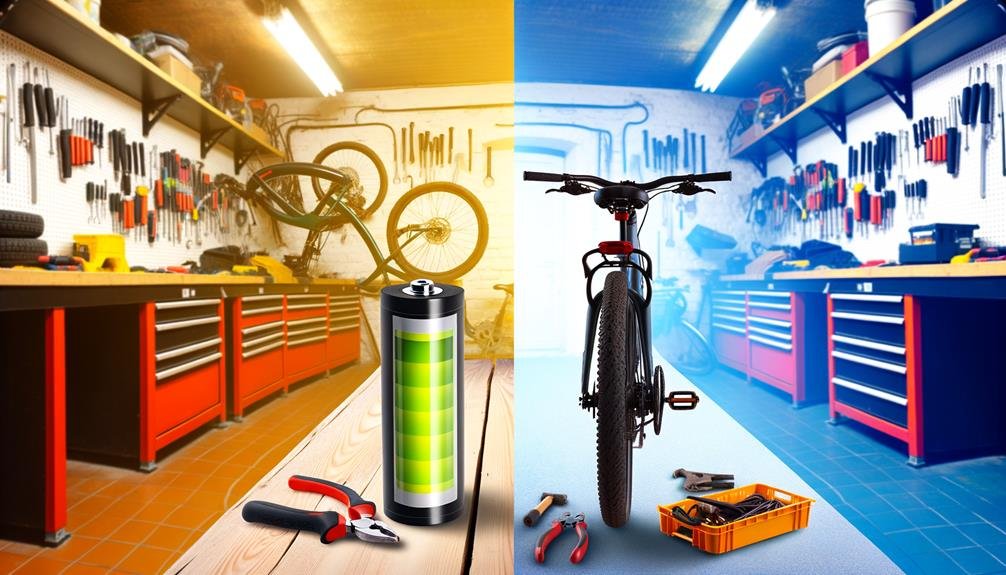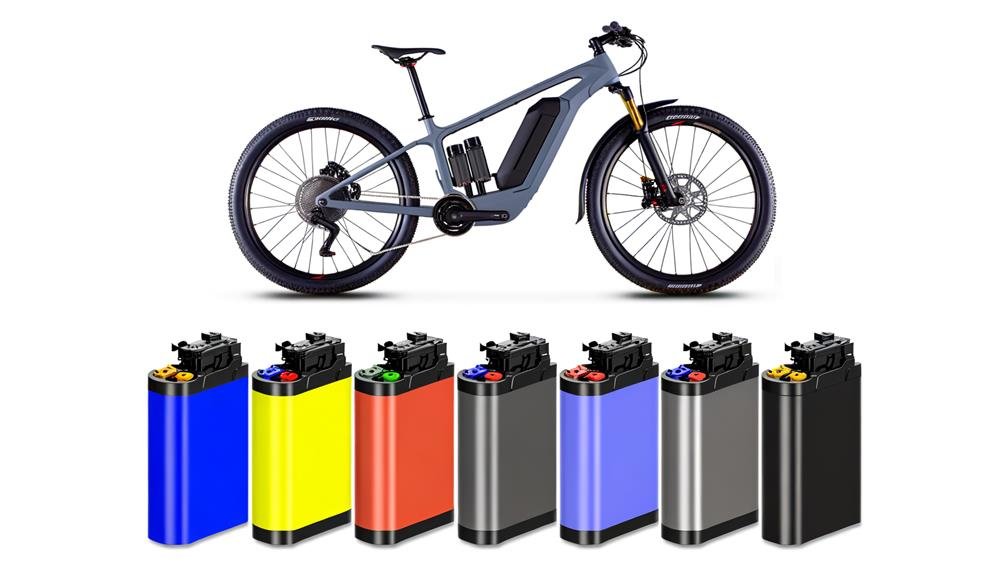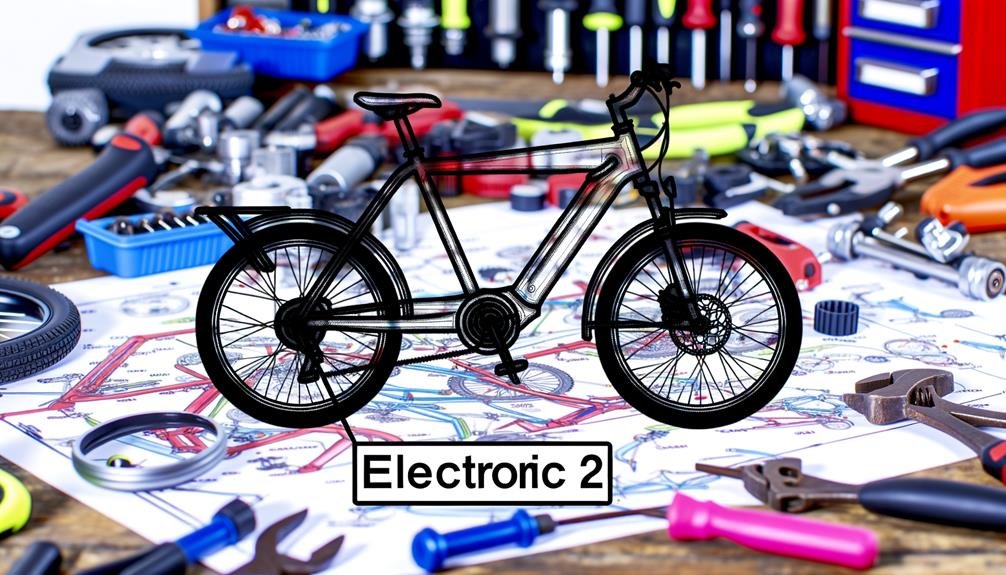Charles Miller is a veteran bike enthusiast with over 12 years of experience dealing with bikes as a mechanic. Despite immense love and expertise for...
Just like how a barista wouldn't dare brew a cup of joe without the right blend of coffee beans, we wouldn't recommend using a different battery on your e-bike without proper research.
The intricacies of voltage, mounts, and electrical connections all come into play when considering a battery swap.
But, what are the risks involved? Can a mismatched battery damage your e-bike? Do different battery brands affect performance?
These are questions we'll address, so stick around as we navigate the winding road of e-bike battery compatibility.
Key Takeaways
- Different ebike batteries have specific voltage requirements and unique mounting systems.
- Matching voltage, mounts, and electrical connections ensures optimal performance and avoids compatibility issues.
- Evaluating power requirements, including battery capacity and voltage levels, is crucial before swapping to a different battery.
- The cost of a new battery can be high, but it can increase range and performance, and replacement options are available from third-party companies or suppliers.
Understanding Ebike Battery Compatibility
To truly grasp the concept of ebike battery compatibility, it's crucial to understand that different ebike batteries come with specific voltage requirements and unique mounting systems. We can't just slap any battery into our ebike and expect it to work flawlessly. Instead, we've to match the voltage, mounts, and electrical connections to ensure an optimal performance of our cherished Electric Bike Batteries.
Now, we all wish for a universal lithium battery pack that could fit any ebike, but the reality is different. Many manufacturers design unique battery cases specifically for their bikes, thus limiting the interchangeability. We can indeed replace the battery cells, but the cases themselves aren't always interchangeable. They're more like the proverbial square pegs and round holes.
Evaluating Power Requirements
Before we even consider swapping out ebike batteries, it's vital that we meticulously evaluate the power requirements of our current battery. Remember, ebike batteries contain specific components like a battery management system (BMS) which monitors and regulates battery performance.
For example, if your electric bike is designed for high power and long range, it's likely to be equipped with a high-capacity lithium battery. These batteries offer extended cycle life, which means they'll provide sufficient power for many rides before needing a replacement. If you're thinking of using a different battery on your ebike, you must ensure it has a comparable capacity. A lower capacity may not deliver the necessary power, while an excessively high capacity could potentially damage the ebike's electrical system.
Furthermore, when evaluating power requirements, it's also important to consider the voltage. Most electric bikes are designed to operate at a specific voltage level, and using a battery with a different voltage could lead to performance issues or even safety risks.
To sum it up, always remember that understanding and evaluating power requirements is a crucial step before making any changes to your ebike battery.
Pros and Cons of Battery Replacement

When considering a battery replacement for our ebike, it's essential to weigh the pros and cons, as this can significantly impact both performance and cost.
One of the primary advantages of a new battery is the potential for increased range and performance. If we use a different battery with higher capacity, we could enhance our riding experience and extend our ebike's range. Moreover, replacement parts allow us to keep enjoying our ebike long after the original battery's lifespan ends.
However, there are potential downsides to battery replacement. The cost of a new battery can be high, adding to the overall expense of maintaining our ebike. There's also the compatibility issue. Not all batteries will work with our original system, potentially leading to performance or safety concerns.
In the balance between old and new, it's critical to consider these pros and cons. We must ensure that the different battery we choose won't only fit the battery on my ebike but also align with our performance expectations and budget.
Cost Analysis of Battery Swap
Having weighed the pros and cons of battery replacement, let's now break down the costs involved in choosing a different battery for our ebike. A cost analysis is crucial before taking the plunge.
The primary cost is the purchase of the new battery. Keep in mind the following:
- Battery brands: The price varies significantly between well-known brands and lesser-known ones. It's often worth paying a premium for a reliable brand.
- Battery type: Lithium-ion batteries tend to be more expensive, but they also offer superior performance and longevity.
- Battery capacity: A high watt-hour battery will cost more, but it'll also give your ebike more range.
Next, consider the labor costs. If you can't do the battery swap yourself, you'll need to pay someone to do it. This cost can vary depending on the complexity of the installation.
Options for Ebike Battery Brands

Diving into the realm of ebike battery brands, we find that the interchangeability hinges on voltage, mounts, and electrical connections, making it vital to match these specifications for a seamless swap. The options available for a different battery depend heavily on these factors, along with the design of your ebike's existing battery compartment.
Some ebike manufacturers design unique battery cases that only fit their bikes, limiting the use of different brand batteries. However, there's a glimmer of hope as we see third-party companies like Ebike Marketplace and Hi-C Battery, offering repacking services with new lithium-ion batteries. They also provide replacement options compatible with various battery brands, broadening the options for individual battery swaps.
Moreover, some suppliers provide batteries compatible with older models and even retrofit options for larger capacity batteries. This ensures ebike owners with older models aren't left behind in the quest for better performance and longevity.
However, compatibility for older models can become a complex issue, often kindling online debate. Therefore, we advise consultation with the manufacturer or a reputable company to identify suitable replacement options. With the right information and guidance, the world of ebike battery brands becomes a place of possibilities.
Frequently Asked Questions
Can I Put a More Powerful Battery on My Ebike?
We're able to put a more powerful battery on our ebike, considering battery compatibility, power requirements, and voltage limitations. We must also regard safety precautions, performance effects, installation process, cost implications, and manufacturer guidelines.
How Do I Match My Battery to My Ebike Motor?
We're matching our ebike's motor to a battery by considering motor compatibility, voltage requirements, and motor capacity. We're focusing on battery lifespan, efficiency, charging options, safety measures, and maintenance for optimal ebike performance and battery brand quality.
Can You Replace a 36V Battery With a 48V Battery on an Ebike?
We can't replace a 36V battery with a 48V without considering voltage compatibility, motor performance, and safety. It'll affect battery longevity, efficiency, and power output. Charger compatibility, dimensions, conversion challenges, and cost are also factors.
Can You Use a Higher Ah Battery on Ebike?
Sure, we can use a higher Ah battery on our ebike. It'll extend the battery lifespan and improve performance, but we must consider compatibility issues, installation process, and potential cost implications for optimal energy efficiency.
Conclusion
In the grand scheme of ebike maintenance, swapping batteries may seem like a walk in the park. But, it's not just a plug-and-play game. Weighing up power requirements, compatibility, and cost can be a tricky balancing act.
Although it's tempting to opt for off-brand batteries, sticking with the same manufacturer and specifications is generally the safest bet.
So, remember folks, don't just swap batteries willy-nilly – it's a science, not an art!

Charles Miller is a veteran bike enthusiast with over 12 years of experience dealing with bikes as a mechanic. Despite immense love and expertise for his Tacoma, he rides his Trek Ebike more. Anytime you meet him, you’ll either hear him talking about Bikes, or writing about all things bikes and cars on this blog.
More Posts


